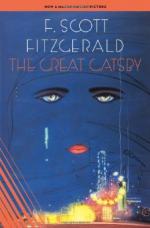|
This section contains 1,262 words (approx. 5 pages at 300 words per page) |

|
Greed and Materialism in "The Great Gatsby"
Summary: the human hubris of greed and materialism riched its height as the U.S. economy roared in the 1920s. The emptiness of this ideology is seen in F. Scott Fitzgerald's "The Great Gatsby." Nick's idealized perspective of Eastern and Western culture in the United States is a theme that underscores the vacuousness of materialistic culture.
The New world was glorified with new hopes and dreams. These dreams and hopes came from the heart and soul of journeymen who looked toward finding a way to establish and maintain an environment in which people can live and thrive in hope to fulfill their own dreams of success. However, as time went on, this dream became desecrated and disintegrated into heaps of ash. The cause of this emanated from the human hubris of greed and respect for material more than the person. During the 1920s, this idea became prevalent with the rising economy. Fitzgerald took notice and wrote these ideas in his Great Gatsby. In an except, Fitzgerald attempts to paint a picture of Nick's perception, perspective, and experience on his amalgamated feelings and lasting impact the East has upon the unblemished and innocent Westerner.
The West seems to harness an imperturbable innocence within everyone that...
|
This section contains 1,262 words (approx. 5 pages at 300 words per page) |

|


